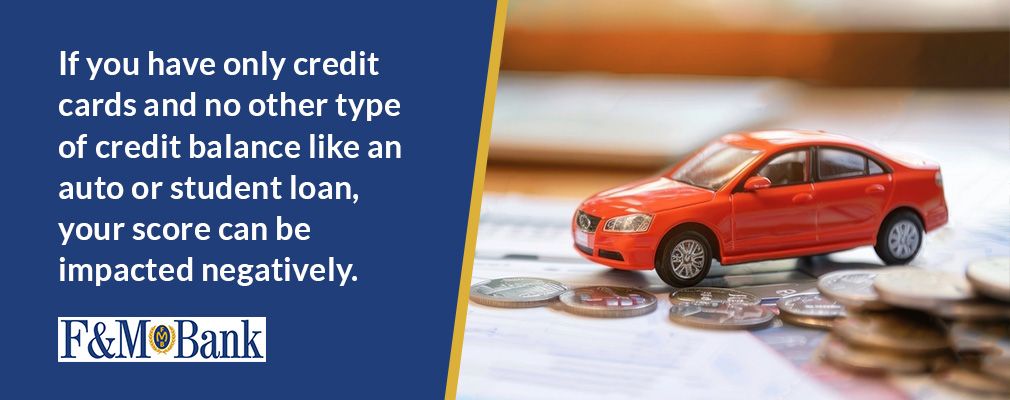Debunking Credit Score Myths for Oklahoma Residents
08/31/2024

F&M Bank (OK): Debunking Credit Score Myths for Oklahoma Residents
As part of our credit score series, we want to take some time to separate the facts from fiction when it comes to your credit score.
Ultimately, we want you to feel knowledgeable and informed to make smart financial decisions and help you improve your credit score to reach your big goals like buying a home in Oklahoma City or upgrading to that new car you’ve always dreamed of having. So here are a few common myths and misconceptions about credit scores that we’re ready to be done with forever.
1. Will Checking My Credit Score Lower It?
The short answer? No. Checking your credit score is considered a “soft pull”, providing you with information about your score and the current loans you have open, without impacting the overall score itself. Opening a new account, like applying for a credit card, is considered a “hard pull”, as the lender will be reviewing your information to see if you’re a trustworthy lender. This can temporarily lower your score.
In fact, checking your credit score is something you should be doing regularly. You can review your credit score within F&M Bank’s mobile app using the Credit Score feature. If you’re the victim of identity theft, you may see accounts on there that you didn’t open yourself. These would need to be flagged immediately to ensure that no one is using your identity to open financial accounts in your name and possibly damaging your credit long term.
2. My Relationship Status or Partners Score Can Affect My Credit Score
This is also not true. Credit scores are individual and personal so are unique to everyone. It’s actually illegal for a lender to take marital status into consideration for any type of loan.
Credit scores will never be impacted by your marital status, unless you are using a joint account. Your score remains your own and won’t merge with your partner’s, but if you’re both attached to the same account, any delinquent behavior on that account will impact both yours and your partner’s scores individually.
3. A Poor Score Will Haunt Me Forever
No matter how low your credit score is, you can always build it back up so this is another false myth. Your credit score is a snapshot of your risk at a certain point in time. As new information is added to your report, your score will change.
While past credit problems can still impact your score, these will impact you less over time and as you make better decisions about your finances. For instance, paying your bills on time after a period of not paying them will help you build back up a lower credit score.
Taking the time to improve your credit score is very important, especially if you’re looking to take out big loans like mortgages to buy a home in Oklahoma City. Correct your past actions by making better choices moving forward and gradually build your score back up over time.
4. Does Closing a Credit Card Improve My Score?
This is also not true, closing an account will not improve your score. If you have an old account that’s rarely used, but has positive signs all over it like on-time payments, you could actually lower your score by closing this account. This is because the history of the account shows a long period of reliable borrowing, which is exactly what you want to be showing to new lenders.

You could also lower your credit utilization rate if you close this account, especially if it’s connected to a credit card or larger loan. This rate is the amount of credit available for you to use, and it’s a good idea to keep this under around 30%. If you remove this account from your list of credit accounts, your overall credit limit could decrease and make it harder for you to stay under 30% with your open accounts.
Closing old accounts also impacts the number of accounts open that you have, along with the average age of your credit history. While not as important as on-time payments and credit utilization in calculating your score, these metrics are contributors to what your overall score is. So anything you can do to keep these higher is good for your score.
If you have a credit card with an annual charge but you’re not using this card often, consider speaking to the credit card company about switching to a card with no annual fee. This will at least keep your credit line open, but you won’t be on the hook for an annual fee.
5. Does Carrying a Balance Increase Credit Score?
No, carrying a balance on your credit accounts does not improve your score. While closing an account completely can lower your score, having a balance can also negatively impact you if your balance is too high.
Again, think about your credit utilization. If carrying a balance means that you’ll be over 30% in utilization across your total credit allowance, your score could go down.
It’s also not a good idea to carry a balance on anything with a higher interest rate, as you’ll be paying more money than what you actually borrowed by the time you pay it back. For some loans, like mortgages or car loans, this often can’t be helped and you’ll be on a fixed payment plan. But for other types of credit like credit cards, a high balance can be incredibly costly.
If you have a large balance on an account with high interest, see if you can transfer this to another card or loan, or consolidate several of your higher interest loans into a single personal loan with a more favorable interest rate. Speak to your local bank if this is something you’re interested in.
Opening credit accounts can help you improve your score, but only if you use these accounts responsibly. Keep your credit usage low and pay off your balance in full each month.

Boost Your Credit Score with F&M Bank!
There are many important factors that help you improve your credit score, but it’s always important to separate the truth from false information. At F&M Bank, we help you understand credit scores and financial information more easily through financial counseling, blogs and the occasional credit seminars and educational workshops. Speak with us if you’re considering a new credit option like a mortgage or credit card, or if you need help improving your credit score.
